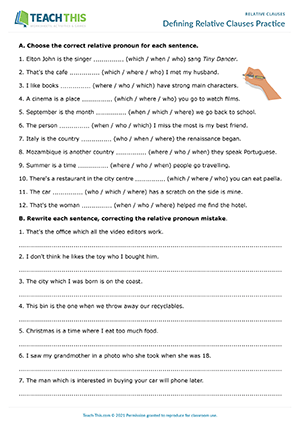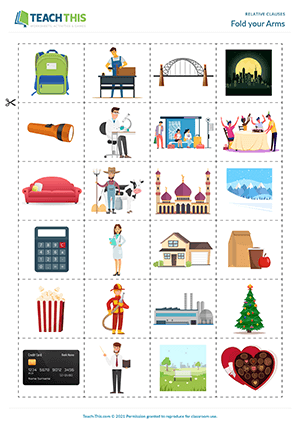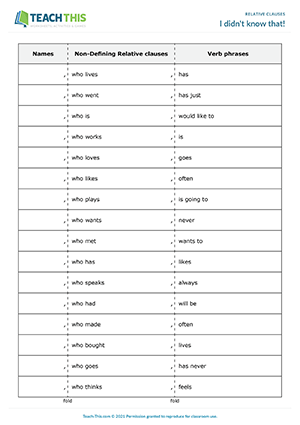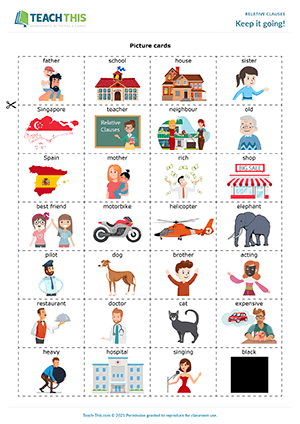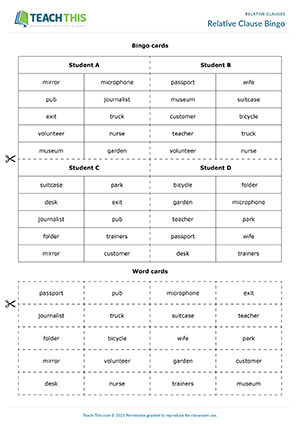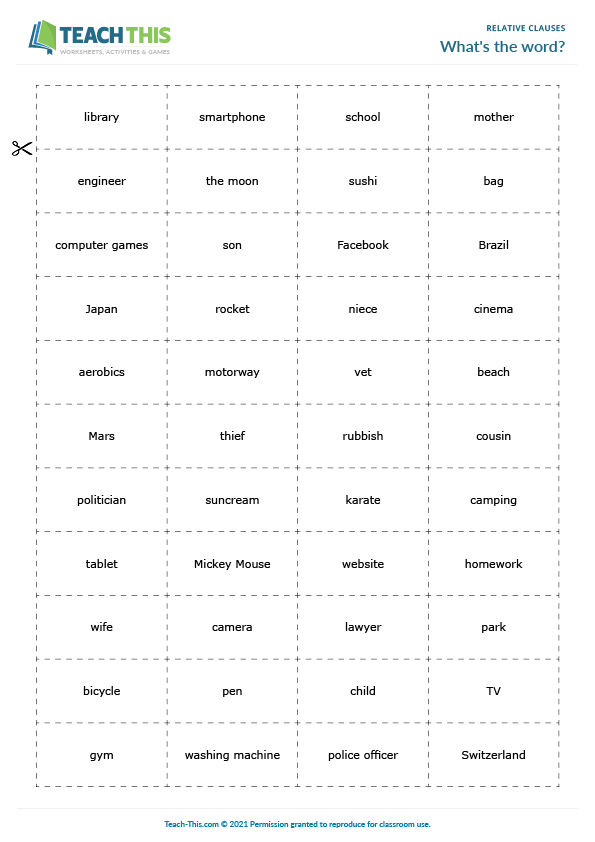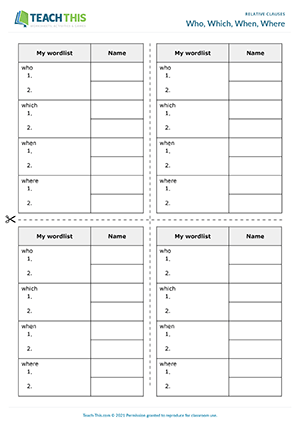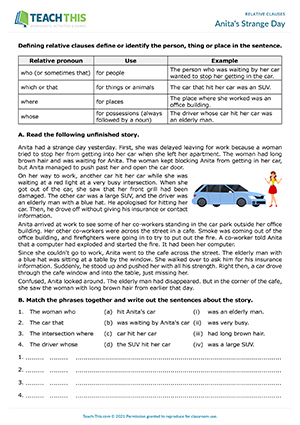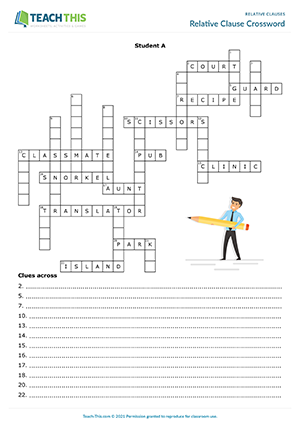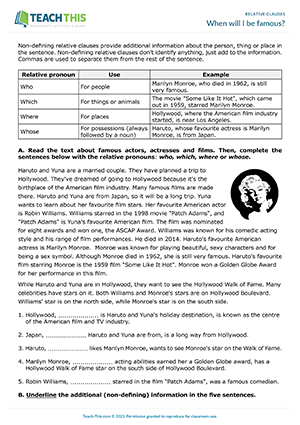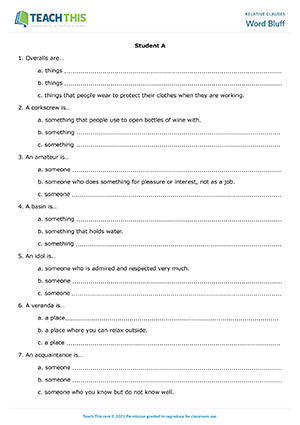This free defining relative clauses worksheet helps students practice defining relative clauses with who, which, where and when. First, students complete each defining relative clause with the correct relative pronoun in brackets. Next, students rewrite defining relative clauses, correcting the relative pronoun mistakes. Students then write definitions for places, things, times and people using defining relative clauses, e.g. 'A kitchen is a room where people store and cook food.' Lastly, students rewrite sentences, combining them together with defining relative clauses.
In this fun defining relative clauses game, students describe pictures of objects, people, places and times with defining relative clauses. In groups, students take turns to pick up a card, look at the picture, place the card face-down and fold their arms. The student then describes the object, person, place or time to the other students using defining relative clauses. When describing pictures, students must keep their arms folded. This is to stop them from miming or using gestures. Students are also not allowed to say the name of the object, person, place or time or use variations of the word. The first student to guess the word wins and keeps the card. The student with the most cards at the end of the game wins.
In this creative non-defining relative clauses activity, students write imaginary information about their classmates using non-defining relative clauses with who. First, students write down the names of everyone in their group in the first column of the worksheet. Students then sit in a circle and fold their worksheet so only the 'Non-Defining Relative clauses' column is showing and give it to the person on their right, who completes the first non-defining relative clause with who any way they like. Students then pass the worksheet to the person on their right who completes the next relative clause. This procedure is repeated until all the non-defining relative clauses with who have been completed. After that, students do the same with the ‘Verb phrases’ column. When the students have finished, they open out their completed worksheets and read the sentences, correcting any mistakes. Finally, students read their sentences to the group. The student, who is the subject of each sentence, says whether the information is true or not, correcting the sentence to make it true if need be.
In this challenging non-defining relative clauses game, students extend a sentence with non-defining relative clauses to make the longest sentence possible. The first player chooses one of their picture cards and begins a sentence about the picture, e.g. 'My father...' The players then take turns to add additional information to the sentence by adding a non-defining relative clause with a picture card or adding an appropriate relative pronoun. If the next player puts down a relative pronoun card (e.g. who), the player after must put down a picture card (e.g. pilot) and add a non-defining relative clause as the next part of the sentence. For example, 'My father, who is a pilot,...' If the next player puts down a picture card (e.g. Singapore), they say the next part of the sentence. For example, 'works in Singapore.' The following player must put down an appropriate relative pronoun card to extend the sentence, e.g. 'My father, who is a pilot, works in Singapore, where...' Players write the sentence down as they go. The group with the longest grammatically correct sentence at the end of the game wins.
In this engaging defining relative clauses game, students play bingo by describing people, places and things using defining relative clauses. In groups, students take turns picking up a word card and describing the person, place or thing on the card using a defining relative clause, e.g. 'It is a place where...' The other students in the group try to guess the word. When the word has been guessed, the students who have the word on their bingo card cross it off. The next student then picks up a word card, and so on. The first student to cross off all the words on their card shouts 'Bingo!' and wins the game.
Here is an entertaining relative clauses game to help students practice defining relative clauses with who, which and where. In groups, students take turns picking up a word card (e.g. library) and giving definitions of the word using defining relative clauses, e.g. 'It's a place where people read books.' The first group member to guess the word keeps the card. The student with the most cards at the end of the game wins.
In this imaginative defining relative clauses game, students practice describing people, things, places and times with defining relative clauses. Give each student a card containing the relative pronouns who, which, when, and where. Students then write two words relating to each relative pronoun in the 'My Word List' column on the card. Next, students write descriptions for the words in their word list using defining relative clauses. Afterwards, in groups, students take turns reading a description for a word on their card to the other group members. The first group member to guess the word wins. The student describing the word then writes the name of the person who guessed correctly in the 'Name' column next to the word. This continues until all the words have been guessed. The student who guessed the most words at the end of the game wins.
Here is a free story-based relative clauses worksheet to help students practice or review defining relative clauses with who, whose, that, which and where. Students start by reading an unfinished story. Students then match phrases together and write out sentences about the story with defining relative clauses. Next, students do a gap-fill exercise where they complete more sentences about the story by choosing the correct relative pronouns. After that, students combine sentences together using relative pronouns. Finally, students have a class discussion to talk about what might happen next in the story and possible endings.
In this productive defining relative clauses activity, students practice describing words using defining relative clauses with who, where, which and that. In two groups, students write down definitions for the words on their crossword. Next, students pair up with someone from the other group. Students then take turns asking their partner for a clue to one of the missing words on their crossword. Their partner then defines the word that appears on their half of the crossword using a defining relative clause and the student tries to guess the word. If the student guesses the word successfully, they write it in the crossword. If not, their partner continues to give more clues until the student is able to guess the word. When the students have finished, they check their answers and spelling by comparing worksheets.
This useful non-defining relative clauses worksheet helps students practice or review non-defining relative clauses while reading and writing about famous actors, actresses and films. First, students read an introduction on non-defining relative clauses. Next, students read a text about famous actors and films and do a gap-fill exercise where they complete sentences with a non-defining relative pronoun. Students then underline the additional (non-defining) information in each sentence. Students then choose phrases to go with sentences and rewrite each sentence using the phrase in a non-defining relative clause. Afterwards, students use their own ideas to complete sentences with non-defining relative clauses.
In this amusing defining relative clauses game, students invent false definitions for words using defining relative clauses and then guess which definition for a word is correct. The worksheets show the correct definitions for words. The students' task is to invent two false definitions for each word by completing the defining relative clauses on the worksheet. In two groups, students write their false definitions. Next, students pair up with someone from the other group and play a game where they guess which definition for a word is correct. Students take turns reading out three possible definitions for a word on their worksheet, without saying which definition is correct. Their partner then guesses the correct definition. For each correct guess, students score a point. The student with the most points at the end of the game is the winner.
Latest Free
Resources
- Everyday Objects Bingo
Everyday Objects
Elementary (A1-A2)
- Action Verb Races
Actions
Elementary (A1-A2)
- Birthday Basics
Birthdays
Elementary (A1-A2)
- Sales Phrasal Verbs
Business Phrasal Verbs
Upper-intermediate (B2)
Latest Member
Resources
- Collocations at Work
Business Collocations
Intermediate (B1)
- Etiquette Trivia Board Game
Etiquette and Manners
Upper-intermediate (B2)
- Everyday Objects Vocabulary
Everyday Objects
Pre-intermediate (A2)
- Let's have a talk
Verb-Noun Collocations
Pre-intermediate (A2)



